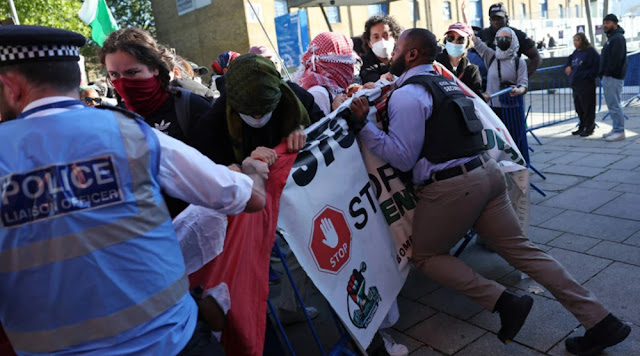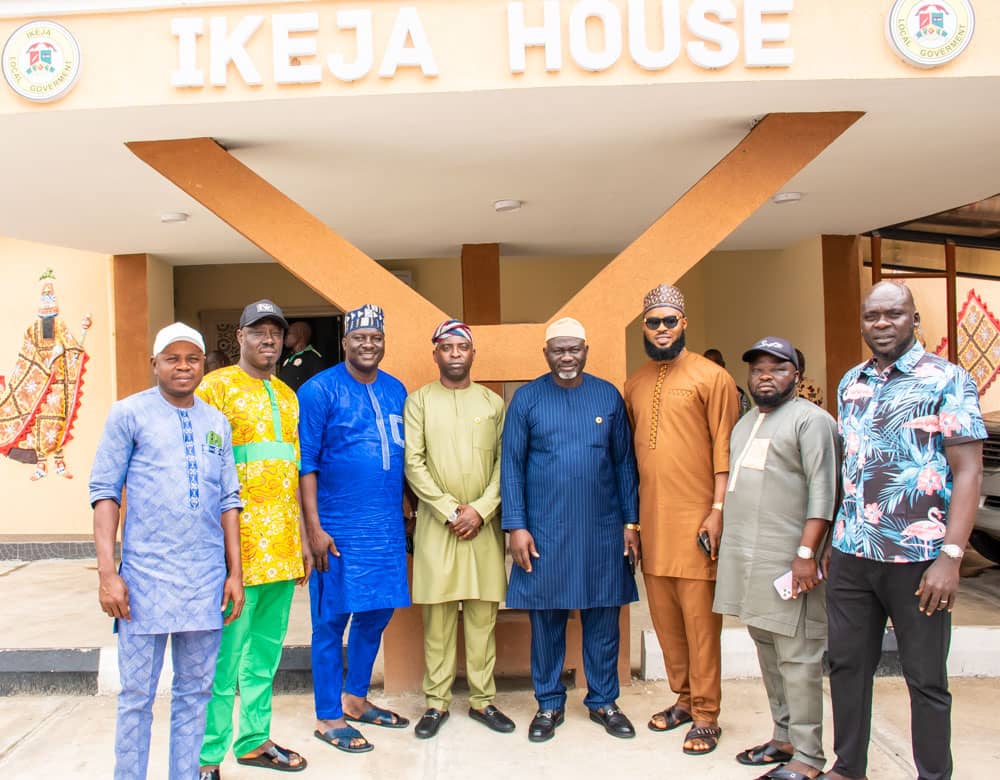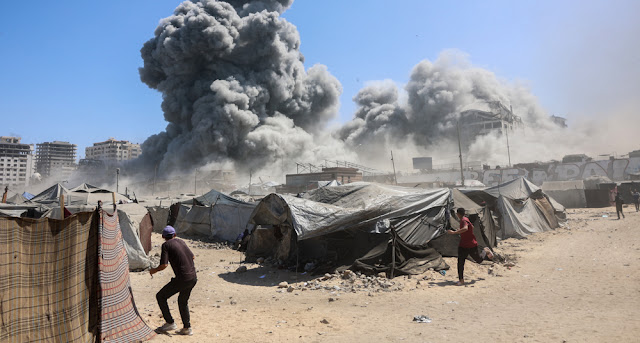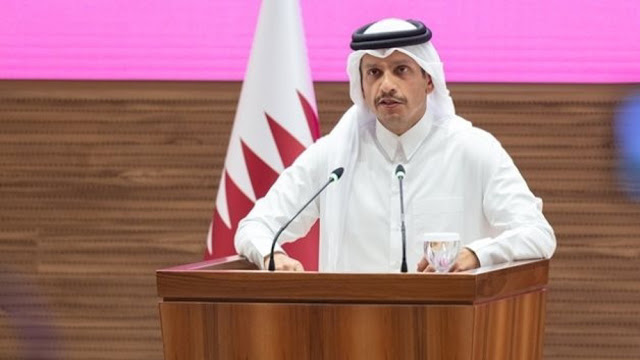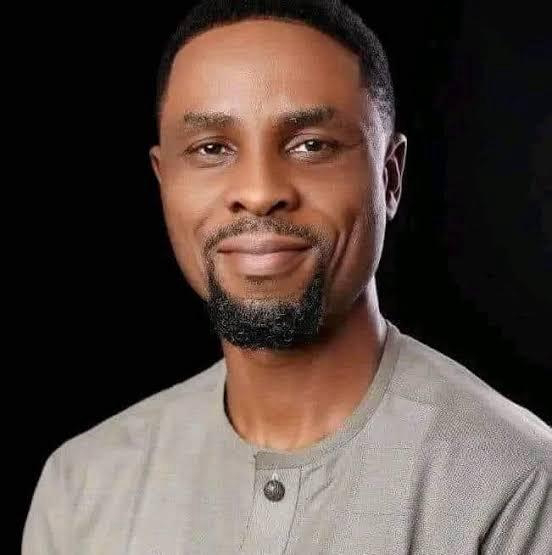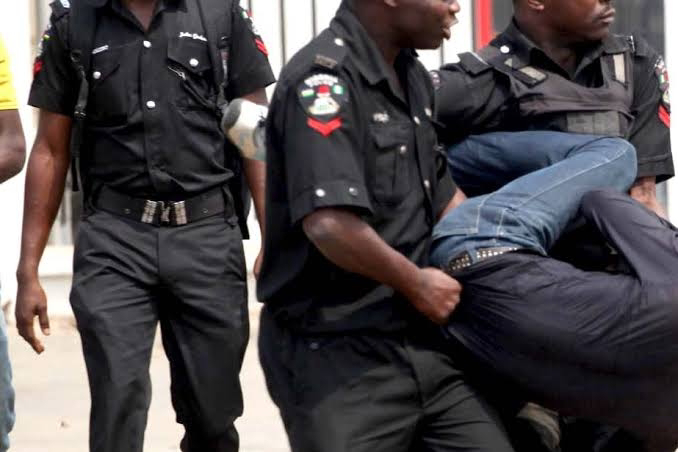In a powerful display of dissent, thousands of protesters flooded the streets of London in two significant demonstrations, voicing their outrage over the participation of Israeli arms manufacturers at the Defense and Security Equipment International (DSEI) arms fair and the controversial visit of Israeli President Isaac Herzog. The protests, driven by deep-seated concerns over the ongoing conflict in Gaza, which many describe as a genocide, underscored the growing tensions surrounding the UK’s relationship with Israeli military entities and their role in global arms trade. The events, marked by clashes with police, arrests, and injuries, have sparked widespread debate about the ethics of hosting such exhibitions and the treatment of peaceful demonstrators.
Demonstrators are held back by police and security outside the entrance to the Defense and Security Equipment International (DSEI) arms exhibition in London, the United Kingdom, on September 9, 2025. (Photo by AFP)
The DSEI Arms Fair: A Focal Point of Controversy
The DSEI arms fair, held at London’s sprawling ExCeL Center, is one of the world’s largest defense and security trade shows, attracting over 1,600 exhibitors from across the globe. This year, the presence of more than 50 Israeli arms companies, including industry giants like Rafael Advanced Defense Systems and Israel Aerospace Industries (IAI), ignited fierce opposition from activists. Both companies, owned by the Israeli government, are key players in the production of military equipment, including drones, missiles, and other advanced weaponry used by the Israeli military. Their participation in the fair, despite the UK government’s decision to bar an official Israeli delegation due to the ongoing war in Gaza, was seen by protesters as a blatant endorsement of Israel’s military actions.
The demonstrations outside the ExCeL Center began early in the day, with thousands of activists converging to block entrances and disrupt the event. Chanting slogans such as “Stop Arming Israel” and “End the Genocide in Gaza,” the protesters aimed to draw attention to the role of these companies in supplying weapons used in the conflict. Many carried banners and placards condemning the UK’s complicity in hosting arms manufacturers they accused of fueling violence in Gaza. The atmosphere was charged with emotion, as activists from diverse backgrounds—students, religious leaders, and human rights advocates—united in their call for accountability.
Clashes with Police and Injuries
As the protests intensified, tensions escalated between demonstrators and the Metropolitan Police, who were deployed in large numbers to secure the perimeter of the ExCeL Center. Officers formed a tight cordon around the venue to ensure that attendees, including arms dealers and military representatives, could enter and exit without disruption. However, the situation quickly deteriorated as protesters attempted to push through the barriers, leading to physical confrontations.
On several occasions, police used significant force to maintain control, resulting in injuries among the protesters. Eyewitnesses reported chaotic scenes, with officers pushing back crowds and using batons to disperse those attempting to breach the cordon. One particularly distressing incident involved a protester who was seen lying on the ground in a cordoned-off area, appearing unresponsive and restrained in handcuffs. Paramedics were called to the scene, and the individual was taken away in an ambulance, raising concerns about the use of excessive force by law enforcement.
The police also detained approximately 20 protesters, encircling them for over an hour in a tactic known as “kettling.” Among those detained was Ajahn Santamono, a Buddhist monk whose presence at the protest underscored the diverse coalition of activists opposing the arms fair. Santamono, a vocal critic of the event, described the DSEI as “obscene” and expressed horror at the police’s response to the demonstrations. “People who contribute to genocide and mass murder are protected and supported, while people of conscience who try to protest this are the ones who are arrested, criminalized, and treated with violence,” he said in a statement that resonated widely among activists.
Ultimately, all but one of the detained protesters were released without charges, but the heavy-handed policing drew sharp criticism from human rights organizations and protest organizers. Many argued that the police response was disproportionate, targeting peaceful demonstrators exercising their right to free expression. The injuries and detentions further fueled public outrage, with social media platforms like X buzzing with posts condemning the police and calling for greater scrutiny of the UK’s role in hosting arms fairs.
The Role of Israeli Arms Manufacturers
At the heart of the protests was the participation of Israeli arms companies, which have faced growing international scrutiny for their role in the Gaza conflict. Rafael Advanced Defense Systems and Israel Aerospace Industries, both state-owned, are key suppliers of military technology to the Israeli Defense Forces (IDF). Rafael is known for producing advanced missile systems, including the Iron Dome, while IAI manufactures a range of drones and aerospace technologies integral to Israel’s military operations.
Elbit Systems, Israel’s largest private arms manufacturer, was another focal point of the protests. The company, which produces a significant portion of the IDF’s drone fleet, has been a frequent target of activist campaigns in the UK and beyond. Despite the UK government’s decision to exclude an official Israeli delegation from DSEI, Elbit Systems announced its intention to participate, further inflaming tensions. Critics argue that the company’s presence at the fair undermines efforts to hold Israel accountable for alleged war crimes in Gaza, where thousands of civilians have been killed or displaced amid ongoing military operations.
The UK government’s decision to allow these companies to exhibit, despite barring an official delegation, was seen by many as a contradictory stance. Activists pointed out that while the government has publicly expressed concern about the humanitarian crisis in Gaza, its decision to permit Israeli arms manufacturers to showcase their products at DSEI sends a conflicting message. The protests, therefore, were not only directed at the companies themselves but also at the UK’s broader complicity in the global arms trade.
The Broader Context: Herzog’s Visit and the Gaza Conflict
The second major demonstration in London was sparked by the visit of Israeli President Isaac Herzog, whose presence in the UK was seen as a provocative move amid the ongoing war in Gaza. Herzog’s visit, which included meetings with British officials, was intended to strengthen diplomatic ties between the two nations. However, for many protesters, it represented an unacceptable normalization of relations with a government accused of committing genocide.
The war in Gaza, which has raged for over a year, has resulted in catastrophic loss of life and widespread destruction. According to international human rights organizations, tens of thousands of Palestinians, including women and children, have been killed, and entire neighborhoods have been reduced to rubble. The Israeli military’s use of advanced weaponry, much of it supplied by companies like Elbit, Rafael, and IAI, has drawn condemnation from the United Nations and other global bodies. Protesters in London argued that Herzog’s visit, coupled with the DSEI arms fair, was a stark reminder of the international community’s failure to hold Israel accountable.
Demonstrators gathered in central London, marching through key landmarks and holding rallies outside government buildings. The protests were marked by powerful speeches from activists, including representatives from Palestinian solidarity groups, who called for an immediate ceasefire and an end to UK support for Israeli military actions. Many carried Palestinian flags and signs reading “Free Palestine” and “Justice for Gaza,” reflecting the deep emotional resonance of the issue.
Voices of Dissent: Activists Speak Out
The protests brought together a diverse coalition of voices, from grassroots organizers to religious leaders and academics. Ajahn Santamono, the Buddhist monk detained during the DSEI demonstration, became a prominent figure in the movement, using his platform to highlight the moral contradictions of the arms fair. “The very fact that such an event is allowed to take place while a genocide unfolds is a stain on our collective conscience,” he said. His words echoed the sentiments of many protesters, who saw the DSEI as a symbol of profiteering from human suffering.
Other activists emphasized the need for systemic change, calling for a boycott of Israeli arms companies and stricter regulations on the global arms trade. Organizations like the Campaign Against Arms Trade (CAAT) and Palestine Action played a central role in mobilizing protesters, providing logistical support and amplifying the demonstrations through social media. CAAT, in particular, has long campaigned against the DSEI, arguing that it facilitates the sale of weapons to regimes with poor human rights records.
The protests also drew attention to the UK’s domestic arms industry, which has faced criticism for its ties to Israeli companies. Elbit Systems, for example, operates several factories in the UK, prompting calls for their closure from activist groups. The demonstrations highlighted the interconnectedness of the global arms trade, with protesters arguing that the UK’s hosting of DSEI makes it complicit in the violence perpetrated by the weapons sold at the fair.
The Response from Authorities and Organizers
The Metropolitan Police defended their actions during the DSEI protests, stating that their primary responsibility was to ensure public safety and prevent disruptions to the event. In a statement, a police spokesperson said, “We respect the right to peaceful protest, but our officers are trained to respond proportionately to any attempts to breach security or endanger others.” The spokesperson also confirmed that an investigation into the incident involving the injured protester was underway, but no further details were provided.
DSEI organizers, meanwhile, sought to distance the event from the controversy, emphasizing its role as a platform for showcasing cutting-edge defense technologies. In a press release, they described the fair as an opportunity for international collaboration and innovation, downplaying the participation of Israeli companies. However, this narrative did little to quell the anger of protesters, who saw the event as a celebration of militarism and oppression.
The UK government has remained largely silent on the protests, with officials avoiding direct comment on the participation of Israeli arms companies. However, the decision to bar an official Israeli delegation from DSEI suggests a degree of sensitivity to the political ramifications of the event. Critics argue that this gesture is insufficient, given the scale of the humanitarian crisis in Gaza and the UK’s broader role in the arms trade.
The Global Implications
The London protests are part of a broader wave of global activism aimed at challenging Israel’s military actions and the international arms trade. Similar demonstrations have taken place in cities across Europe, North America, and beyond, as public awareness of the Gaza conflict grows. The participation of Israeli arms companies at events like DSEI has become a lightning rod for criticism, with activists arguing that such platforms legitimize and profit from human rights abuses.
The protests also raise broader questions about the ethics of the global arms trade and the role of governments in regulating it. The UK, as one of the world’s leading arms exporters, faces increasing pressure to align its policies with its stated commitment to human rights. For many protesters, the presence of Israeli arms companies at DSEI is a stark reminder of the gap between rhetoric and reality.
Conclusion
The twin demonstrations in London over the DSEI arms fair and Isaac Herzog’s visit represent a powerful moment of resistance against the backdrop of the Gaza conflict. By targeting the participation of Israeli arms manufacturers and the UK’s diplomatic ties with Israel, protesters have brought global attention to the human cost of the arms trade and the ongoing war. The clashes with police, the injuries, and the detentions only underscore the intensity of the issue and the determination of activists to demand change.
As the conflict in Gaza continues to claim lives and displace communities, the protests in London serve as a call to action for governments, corporations, and individuals to confront the moral implications of their choices. Whether through boycotts, divestment, or continued activism, the demonstrators have made it clear that silence is not an option. For now, the voices of dissent in London echo far beyond the ExCeL Center, resonating with a global movement for justice and accountability.


